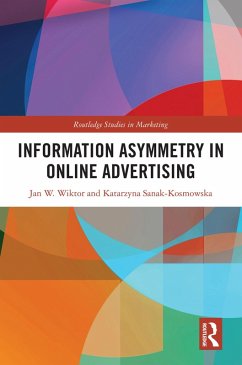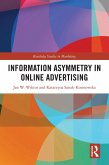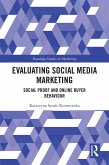42,95 €
42,95 €
inkl. MwSt.
Sofort per Download lieferbar

21 °P sammeln
42,95 €
Als Download kaufen

42,95 €
inkl. MwSt.
Sofort per Download lieferbar

21 °P sammeln
Jetzt verschenken
Alle Infos zum eBook verschenken
42,95 €
inkl. MwSt.
Sofort per Download lieferbar
Alle Infos zum eBook verschenken

21 °P sammeln
- Format: ePub
- Merkliste
- Auf die Merkliste
- Bewerten Bewerten
- Teilen
- Produkt teilen
- Produkterinnerung
- Produkterinnerung

Bitte loggen Sie sich zunächst in Ihr Kundenkonto ein oder registrieren Sie sich bei
bücher.de, um das eBook-Abo tolino select nutzen zu können.
Hier können Sie sich einloggen
Hier können Sie sich einloggen
Sie sind bereits eingeloggt. Klicken Sie auf 2. tolino select Abo, um fortzufahren.

Bitte loggen Sie sich zunächst in Ihr Kundenkonto ein oder registrieren Sie sich bei bücher.de, um das eBook-Abo tolino select nutzen zu können.
This book presents an assessment of the forms and range of consumer behaviour manipulation through information asymmetry in online advertising and explores the possible causes, forms and effects. The work offers a new approach to the role of advertising in the digital world, especially its forms and impact strategies.
- Geräte: eReader
- mit Kopierschutz
- eBook Hilfe
Andere Kunden interessierten sich auch für
![Information Asymmetry in Online Advertising (eBook, PDF) Information Asymmetry in Online Advertising (eBook, PDF)]() Jan W. WiktorInformation Asymmetry in Online Advertising (eBook, PDF)42,95 €
Jan W. WiktorInformation Asymmetry in Online Advertising (eBook, PDF)42,95 €![Evaluating Social Media Marketing (eBook, ePUB) Evaluating Social Media Marketing (eBook, ePUB)]() Katarzyna Sanak-KosmowskaEvaluating Social Media Marketing (eBook, ePUB)42,95 €
Katarzyna Sanak-KosmowskaEvaluating Social Media Marketing (eBook, ePUB)42,95 €![Digital Marketing (eBook, ePUB) Digital Marketing (eBook, ePUB)]() Alan CharlesworthDigital Marketing (eBook, ePUB)48,95 €
Alan CharlesworthDigital Marketing (eBook, ePUB)48,95 €![Introduction to Advertising (eBook, ePUB) Introduction to Advertising (eBook, ePUB)]() Emmanuel MogajiIntroduction to Advertising (eBook, ePUB)49,95 €
Emmanuel MogajiIntroduction to Advertising (eBook, ePUB)49,95 €![Revolutionizing the AI-Digital Landscape (eBook, ePUB) Revolutionizing the AI-Digital Landscape (eBook, ePUB)]() Revolutionizing the AI-Digital Landscape (eBook, ePUB)59,95 €
Revolutionizing the AI-Digital Landscape (eBook, ePUB)59,95 €![Promotional Marketing (eBook, ePUB) Promotional Marketing (eBook, ePUB)]() Roddy MullinPromotional Marketing (eBook, ePUB)35,95 €
Roddy MullinPromotional Marketing (eBook, ePUB)35,95 €![Hitmakers (eBook, ePUB) Hitmakers (eBook, ePUB)]() Ana AndjelicHitmakers (eBook, ePUB)29,95 €
Ana AndjelicHitmakers (eBook, ePUB)29,95 €-
-
-
This book presents an assessment of the forms and range of consumer behaviour manipulation through information asymmetry in online advertising and explores the possible causes, forms and effects. The work offers a new approach to the role of advertising in the digital world, especially its forms and impact strategies.
Hinweis: Dieser Artikel kann nur an eine deutsche Lieferadresse ausgeliefert werden.
Dieser Download kann aus rechtlichen Gründen nur mit Rechnungsadresse in A, B, BG, CY, CZ, D, DK, EW, E, FIN, F, GR, HR, H, IRL, I, LT, L, LR, M, NL, PL, P, R, S, SLO, SK ausgeliefert werden.
Hinweis: Dieser Artikel kann nur an eine deutsche Lieferadresse ausgeliefert werden.
Produktdetails
- Produktdetails
- Verlag: Taylor & Francis eBooks
- Seitenzahl: 230
- Erscheinungstermin: 30. September 2021
- Englisch
- ISBN-13: 9781000454055
- Artikelnr.: 62413914
- Verlag: Taylor & Francis eBooks
- Seitenzahl: 230
- Erscheinungstermin: 30. September 2021
- Englisch
- ISBN-13: 9781000454055
- Artikelnr.: 62413914
- Herstellerkennzeichnung Die Herstellerinformationen sind derzeit nicht verfügbar.
Jan W. Wiktor is a Full Professor of Economic Sciences in the Department of Marketing, College of Management Sciences and Quality at Cracow University of Economics (CUE). His research interests include marketing management, marketing communication, international marketing, euromarketing, and international management. He is the head of CUE's Department of Marketing, member of the University Council, chairman of the Advisory Board of the Polish Scientific Marketing Association, member of the Committee for Organizational and Management Sciences of the Polish Academy of Sciences (PAN) and the Commission for Economic Sciences of the Polish Academy of Learning (PAU).
Katarzyna Sanak-Kosmowska holds a PhD in Economics and is Assistant Professor in the Department of Marketing, College of Management Sciences and Quality at Cracow University of Economics. Her research interests include online marketing communication, the psychology of consumer behaviour, and advertising. She is a member of the American Marketing Association, member of the International Association of Researchers and Scientists in Latvia, member of the Polish Scientific Marketing Association, and member of the Spokespersons for Science Association.
Katarzyna Sanak-Kosmowska holds a PhD in Economics and is Assistant Professor in the Department of Marketing, College of Management Sciences and Quality at Cracow University of Economics. Her research interests include online marketing communication, the psychology of consumer behaviour, and advertising. She is a member of the American Marketing Association, member of the International Association of Researchers and Scientists in Latvia, member of the Polish Scientific Marketing Association, and member of the Spokespersons for Science Association.
Introduction
PART I
THEORETICAL FRAMEWORK - ONLINE ADVERTISING, INFORMATION ASYMMETRY,
MANIPULATION
1. Online advertising: characteristics, functions and forms of
advertising in a digital world
2. The causes and consequences of information asymmetry in online
advertising
3. Manipulation in online advertising: identifiers and mechanism of
influencing e-consumers
4. Research objectives and hypotheses
PART II
RESEARCH RESULTS - INFORMATION ASYMMETRY AND THE WORLD OF
MANIPULATION IN ONLINE ADVERTISING
5. Moral hazard in online advertising strategies and firms' attitudes
towards it
6. Adverse selection in light of the research of declaratory recipients
of ads (e-consumers)
PART III
MANAGERIAL AND THEORETICAL IMPLICATIONS
7. Implications of the research findings
8. Moral hazard as a challenge for contemporary firms
9. Trends in further research into information asymmetry in online
advertising and the manipulation of e-consumer behaviour
SUMMARY
Index
PART I
THEORETICAL FRAMEWORK - ONLINE ADVERTISING, INFORMATION ASYMMETRY,
MANIPULATION
1. Online advertising: characteristics, functions and forms of
advertising in a digital world
2. The causes and consequences of information asymmetry in online
advertising
3. Manipulation in online advertising: identifiers and mechanism of
influencing e-consumers
4. Research objectives and hypotheses
PART II
RESEARCH RESULTS - INFORMATION ASYMMETRY AND THE WORLD OF
MANIPULATION IN ONLINE ADVERTISING
5. Moral hazard in online advertising strategies and firms' attitudes
towards it
6. Adverse selection in light of the research of declaratory recipients
of ads (e-consumers)
PART III
MANAGERIAL AND THEORETICAL IMPLICATIONS
7. Implications of the research findings
8. Moral hazard as a challenge for contemporary firms
9. Trends in further research into information asymmetry in online
advertising and the manipulation of e-consumer behaviour
SUMMARY
Index
Introduction
PART I
THEORETICAL FRAMEWORK - ONLINE ADVERTISING, INFORMATION ASYMMETRY, MANIPULATION
SUMMARY
Index
PART I
THEORETICAL FRAMEWORK - ONLINE ADVERTISING, INFORMATION ASYMMETRY, MANIPULATION
- Online advertising: characteristics, functions and forms of advertising in a digital world
- The causes and consequences of information asymmetry in online advertising
- Manipulation in online advertising: identifiers and mechanism of influencing e-consumers
- Research objectives and hypotheses
- Moral hazard in online advertising strategies and firms' attitudes towards it
- Adverse selection in light of the research of declaratory recipients of ads (e-consumers)
- Implications of the research findings
- Moral hazard as a challenge for contemporary firms
- Trends in further research into information asymmetry in online advertising and the manipulation of e-consumer behaviour
PART II
RESEARCH RESULTS - INFORMATION ASYMMETRY AND THE WORLD OF MANIPULATION IN ONLINE ADVERTISING
PART III
MANAGERIAL AND THEORETICAL IMPLICATIONS
SUMMARY
Index
Introduction
PART I
THEORETICAL FRAMEWORK - ONLINE ADVERTISING, INFORMATION ASYMMETRY,
MANIPULATION
1. Online advertising: characteristics, functions and forms of
advertising in a digital world
2. The causes and consequences of information asymmetry in online
advertising
3. Manipulation in online advertising: identifiers and mechanism of
influencing e-consumers
4. Research objectives and hypotheses
PART II
RESEARCH RESULTS - INFORMATION ASYMMETRY AND THE WORLD OF
MANIPULATION IN ONLINE ADVERTISING
5. Moral hazard in online advertising strategies and firms' attitudes
towards it
6. Adverse selection in light of the research of declaratory recipients
of ads (e-consumers)
PART III
MANAGERIAL AND THEORETICAL IMPLICATIONS
7. Implications of the research findings
8. Moral hazard as a challenge for contemporary firms
9. Trends in further research into information asymmetry in online
advertising and the manipulation of e-consumer behaviour
SUMMARY
Index
PART I
THEORETICAL FRAMEWORK - ONLINE ADVERTISING, INFORMATION ASYMMETRY,
MANIPULATION
1. Online advertising: characteristics, functions and forms of
advertising in a digital world
2. The causes and consequences of information asymmetry in online
advertising
3. Manipulation in online advertising: identifiers and mechanism of
influencing e-consumers
4. Research objectives and hypotheses
PART II
RESEARCH RESULTS - INFORMATION ASYMMETRY AND THE WORLD OF
MANIPULATION IN ONLINE ADVERTISING
5. Moral hazard in online advertising strategies and firms' attitudes
towards it
6. Adverse selection in light of the research of declaratory recipients
of ads (e-consumers)
PART III
MANAGERIAL AND THEORETICAL IMPLICATIONS
7. Implications of the research findings
8. Moral hazard as a challenge for contemporary firms
9. Trends in further research into information asymmetry in online
advertising and the manipulation of e-consumer behaviour
SUMMARY
Index
Introduction
PART I
THEORETICAL FRAMEWORK - ONLINE ADVERTISING, INFORMATION ASYMMETRY, MANIPULATION
SUMMARY
Index
PART I
THEORETICAL FRAMEWORK - ONLINE ADVERTISING, INFORMATION ASYMMETRY, MANIPULATION
- Online advertising: characteristics, functions and forms of advertising in a digital world
- The causes and consequences of information asymmetry in online advertising
- Manipulation in online advertising: identifiers and mechanism of influencing e-consumers
- Research objectives and hypotheses
- Moral hazard in online advertising strategies and firms' attitudes towards it
- Adverse selection in light of the research of declaratory recipients of ads (e-consumers)
- Implications of the research findings
- Moral hazard as a challenge for contemporary firms
- Trends in further research into information asymmetry in online advertising and the manipulation of e-consumer behaviour
PART II
RESEARCH RESULTS - INFORMATION ASYMMETRY AND THE WORLD OF MANIPULATION IN ONLINE ADVERTISING
PART III
MANAGERIAL AND THEORETICAL IMPLICATIONS
SUMMARY
Index







